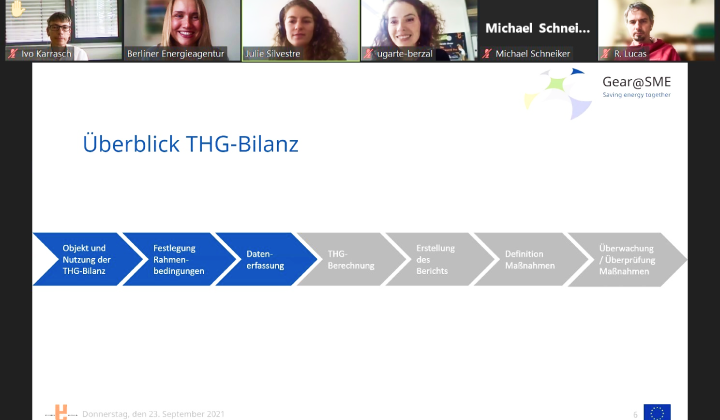
23 Sep Without data everything is nothing
How can SMEs generate data to do a corporate carbon footprint? At the second Adlershof workshop, they learned about it from the Berlin Energy Agency
Berlin – Many small and medium-sized enterprises (SMEs) want to save energy or even become climate-neutral. But how do they get started? What data needs to be collected? And how can data be determined? This is precisely the point of departure for the second digital workshop held by the Berlin Energy Agency (BEA) in Adlershof as part of the EU-funded GEAR@SME project. The project aims to support SMEs in saving energy and thus reducing CO2 emissions. The transfer of demand-oriented know-how and training are important components of the project.
Julie Silvestre and Palmira Ugarte Berzal, both energy experts at the BEA, begin their lecture by explaining what a carbon footprint is and how to prepare one for a company. Here, the participants learn that there are certain obligations to fulfil according to the Greenhouse Gas (GHG) Protocol.
In addition, Silvestre explains that the GHG balance includes on the one hand activity data and on the other hand emission factors. Activity data consists of company-specific primary data, for example from employee surveys, fuel cards, and data from invoices. Secondary data consist for example of industry average data, financial data, or proxy data). All emissions are converted into CO2 equivalents.
The good news for SMEs that are just starting out is that they can start with average data and then collect more and more specific data later.
The greenhouse gases emitted by an SME are calculated from three scopes: first, direct emissions (for example, emissions generated from the own vehicle fleet), second, indirect emissions (for example, from purchased energy such as electricity), and third, indirect emissions along the entire value chain. According to the GHG protocol, Scope 1 and 2 are mandatory, explains Silvestre. Yet, many SMEs, clients and investors are interested in having a wider view of their climate impact considering the emissions all over the supply chain. Scope 3 is responsible for the most of the global emissions, but it is still challenging to get relevant data.
Energy efficiency has a direct impact on Scope 1 and 2 and therefore it is an influential measure to reduce the carbon footprint of a SME. The participating SMEs at that workshop day take away a lot from this day and still have some questions, which Silvestre and Ugarte Berzal are happy to answer.
Are you an SME located in the Berlin-Brandenburg area? Would you like to learn how to save energy and CO2 emissions? The GEAR@SME team of the Berlin Energy Agency will support you!
Image: Workshop session about GHG data generation for a corporate carbon footprint (Berlin Energy Agency)


